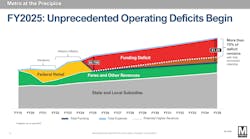The Washington Metropolitan Area Transit Authority (WMATA) has been able to celebrate many victories in the past year, including the opening of the Silver Line Extension and the Potomac Yard station, improved service on its Metrorail system, growing customer satisfaction and ridership. However, it’s near-term future is clouded by “the precipice of Metro’s funding crisis” in Fiscal Year (FY) 2025 when the authority is expected to face a $750 million deficit that will grow to an anticipated $1.2 billion by FY35 if no action is taken.
"We cannot afford to let Metro fail. It is too important to the region, our economy and quality of life, connecting people to jobs and family, reducing gridlock and cutting carbon emissions," said WMATA General Manager and Chief Executive Officer Randy Clarke. "Concerns were first raised about the lack of a dedicated and ongoing funding source in 1976 when Metrorail opened, and it is time for the region to come together to solve this serious financial challenge."
Simply cutting costs will not be enough to salvage WMATA’s financial future. WMATA explains balancing the budget with service cuts would mean the elimination of two-thirds of WMATA’s existing service, including:
- No service after 9:30 p.m.
- 135 bus lines would be reduced to 37 lines
- Train wait times would be between 20 to 30 minutes
- MetroAccess would serve a smaller area during reduced hours.
WMATA says nearly 3 million people living in the region, 70 percent of jobs and 50 percent of employers are located within half-mile of a WMATA station or bus stop. Given WMATA’s reach, the economic impact of service cuts would drastically reduce transit’s value to the region.
"Without a strong, reliable transit system millions of people across the region stand to lose," said WMATA Board Chair Paul C. Smedberg. "Customers would see longer waits, constant gridlock, higher fares and reduced operating hours and the region’s economy could stagnate."
WMATA will engage with federal, state and local leaders, as well as other stakeholders over the next year to explore long-term funding options.
A presentation on the pending financial crisis can be found at WMATA’s website.

Mischa Wanek-Libman | Group Editorial Director
Mischa Wanek-Libman is director of communications with Transdev North America. She has more than 20 years of experience working in the transportation industry covering construction projects, engineering challenges, transit and rail operations and best practices.
Wanek-Libman has held top editorial positions at freight rail and public transportation business-to-business publications including as editor-in-chief and editorial director of Mass Transit from 2018-2024. She has been recognized for editorial excellence through her individual work, as well as for collaborative content.
She is an active member of the American Public Transportation Association's Marketing and Communications Committee and served 14 years as a Board Observer on the National Railroad Construction and Maintenance Association (NRC) Board of Directors.
She is a graduate of Drake University in Des Moines, Iowa, where she earned a Bachelor of Arts degree in Journalism and Mass Communication.





